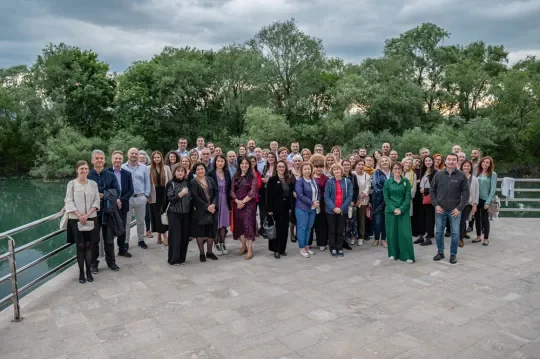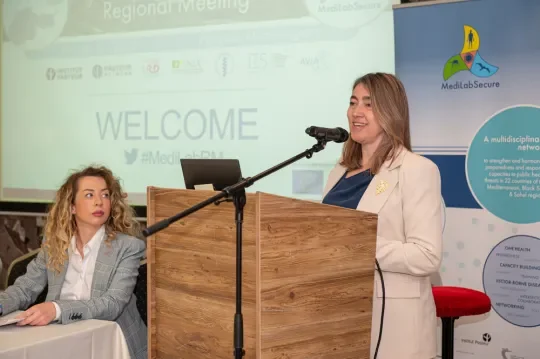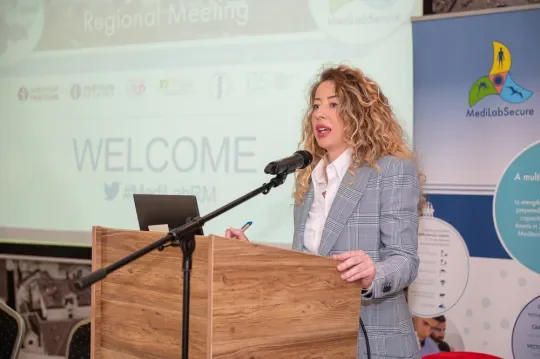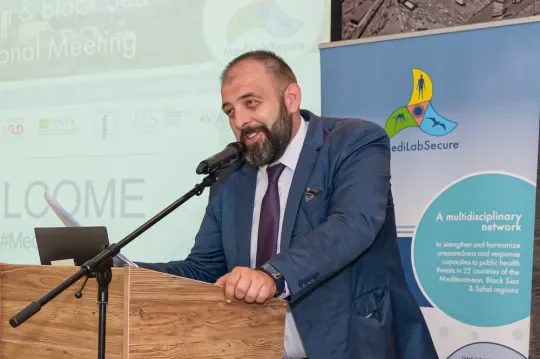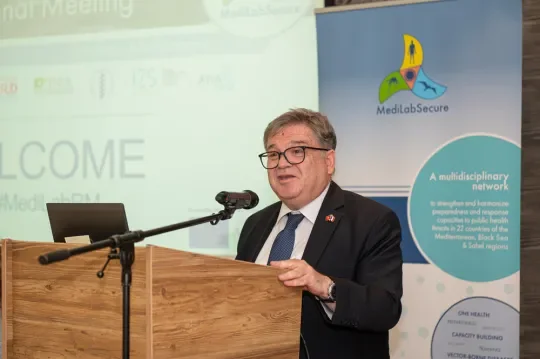Balkan & Black Sea Regional Meeting

Regional Meeting in Petrovac, Montenegro
Hosted by the Montenegro, the Balkan & Black Sea meeting was held from the May 8th to 11th at the Hotel Palas in Petrovac. Thanks to the support and cooperation of the hosting country and the French Embassy, the event gathered experts from different disciplines and sectors representative of the MediLabSecure project (human & animal virology, medical entomology, public health & veterinary services officers and geo-spatial modeling teams) covering the One Health approach.
OBJECTIVES & CONTENT
Organized by the project’s coordination team from Institut Pasteur with the collaboration of the members of the implementing European consortium and Montenegro's national focal points, this meeting brought together more than 65 participants from the 9 countries of the region: Albania, Armenia, Bosnia and Herzegovina, Georgia, Kosovo*, Montenegro, North Macedonia, Serbia, and Turkey.
The main objective of this regional meeting was to offer intersectoral and cross-country networking opportunities to encourage new collaborations while consolidating existing connections and, most importantly, to advocate the One Health approach for early warning and preparedness of zoonotic diseases. Additionally, this event allowed all participants to exchange about their concerns, potential future needs and opportunities on the implementation of MediLabSecure activities in their respective countries through experience sharing and multisectoral exercise.
This meeting had a special focus on the Congo-Crimean Hemorrhagic Fever Virus, a real concern in the region, with keynote presentations and exercises, all while keeping the "One Health" spirit that constitutes the roots of the MediLabSecure project.
*This designation is without prejudice to positions on status and is in line with UNSCR 1244 and ICI Advisory opinion on the Kosovo declaration of independance
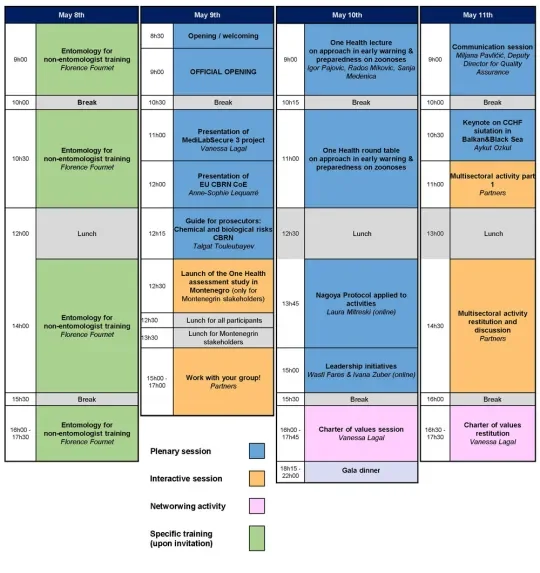
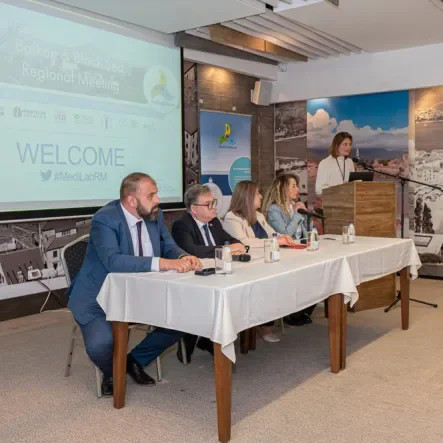
At the official opening, three representatives of the Montenegrin government directly implicated in the One Health approach were present: Her Excellency, the Minister of Science, Professor Biljana Scepanovic; the Director General of Directorate for Public Health, Precursors and Cosmetics products, Dr Ivana Zivkovic and the Director of Administration for Food Safety, Veterinary and Phytosanitary Affairs, Mr Vladimir Djakovic. The French Ambassador, Mr Christian Thimonier was present as well to show his support toward the MediLabSecure project in the country. Each representative highlighted briefly the importance of a One Health approach with the point of view in their relative ministry, as well as the impact of the MediLabSecure projet in the country.
The official opening ended by a welcoming speech delivered by the European Comission program manager Mme Anne-Sophie Lequarré in which she particularly stressed the importance of the One Health approach to mitigate vector borne diseases risks. Now that the One Health concept is well understood at an operational level, there is a real need to translate it into concrete actions.
PRESENTATIONS
Presentations given during this meeting are available below.
Day 1
- Entomology for non-entomologist training - Dr. Florence Fournet, Medical Entomology Key Expert from IRD & Dr. Igor Pajovic, Assistant Professor at Biotechnical Faculty from the University of Montenegro
Day 2
- Opening ceremony and speech from Professor Biljana Scepanovic - Minister of Science
- Speech from Dr. Ivana Zivkovic - Director General of Directorate for Public Health, Precursors and Cosmetics products
- Speech from Mr Vladimir Djakovic - Director of Administration for Food Safety, veterinary and phytosanitary affairs
- Speech from Mr Christian Thimonier - French Ambassador in Montenegro
- Last opening speech by Anne-Sophie Lequarré - Program Manager at EU CBRN
- Presentation of the MediLabSecure project by Dr. Vanessa Lagal - Project Manager from Institut Pasteur
- Presentation of the EU CBRN CoE initiative by Anne-Sophie Lequarré - Program Manager at EU CBRN
- Guide for prosecutors: Chemical and Biological risks CBRN presented by Talgat Touleubayev - Regional Coordinator of South East and Eastern Europe region CBRN CoE
Day 3
- Balkan & Black Sea region experience sharing on One Health implementation: the hosted country presented the main activities and actions implemented in Montenegro followed by the 8 other countries present to share the One Health implementation in their countries
- Nagoya Protocol applied to MediLabSecure activities by Laura Mitreski - Development Officer at IRD and Member of the IRD's Nagoya committee
- Leadership initiatives: announcement of the awardees from the call for leadership initiative and provide them with the opportunity to present their project
- Dr. Wasfi Fares, Biologist Assistant at Institut Pasteur de Tunis
- Dr. Bojan Azdic, Senior Researcher for Molecular Diagnostics at the Diagnostic Veterinary Laboratory, Montenegro
Day 4
- Communication preparedness - Dr Miljana Pavlicic, Deputy Director for Quality Insurance from Institute of Public Health Montenegro
- Keynote of CCHF situation in the Balkan & Black Sea region - Dr. Aykut Ozkul, member of the network and professor of virology from the university of Ankara, Turkey
- Multisectoral Exercise: design of an integrated surveillance plan for CCHF applying the One Health approach
- Charter of Values Restitution - Dr. Vanessa Lagal, project manager
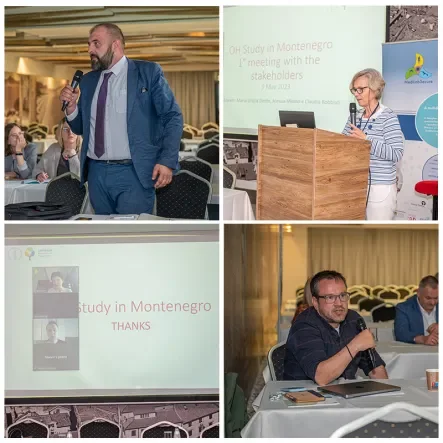
Launch of the One Health MediLabSecure Situation Analysis study in Montenegro
The public health expertise lead by ISS team took the opportunity of the regional meeting to launch the One Health MediLabSecure Situation Analysis study (OHMeSA) on integrated surveillance of vector-borne diseases in Montenegro. The goal is to contribute to the integration of human, animal, and entomological surveillance of arboviruses and emerging infectious diseases, and the inclusion of relevant environmental and social data to enhance early warning capacity in the region...
The session included a presentation on the timeline steps and methodology of the study. Key milestones discussed during the session included:
- to identify relevant stakeholders to be involved in the study in Montenegro,
- to prioritize main threats to be addressed in the study through an online workshop,
- and the technical implementation of the study during a one-week site visit.
This session marked an important step in achieving the project's goal of producing a Strategic document with recommendations for enhancing operationalization of One Health an integrated surveillance system.
"Work with your group" session
The sessions were designed to honor the essence of collaboration, providing the beneficiaries with a special chance to communicate with the project's implementing partners. During this session, the beneficiaries had the opportunity to express their needs and expectations while also engaging with colleagues from other countries to discover opportunities for mutual support. Additionally, the sessions allowed experts from different countries to strengthen their professional relationships and engage in discussions about the successes and challenges they currently face during the implementation of an integrated surveillance system in their country.
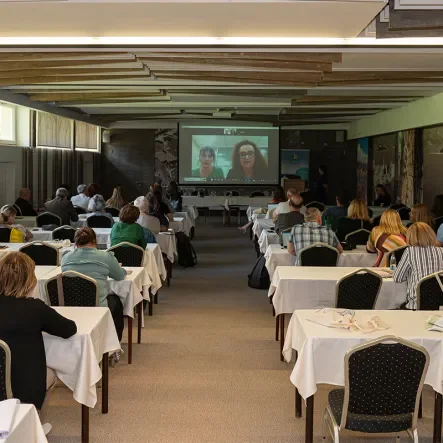
The Nagoya Protocol session
Led by two researchers working as Nagoya Scientific Referents in IRD, the session came to life with their expertise. The primary objective was to introduce the fundamental principles of the Nagoya Protocol and create a sense of awareness regarding its practical implementation. The session began by providing an insightful overview of the context and rationale behind the creation of the protocol. Going deeper, the main pillars of the protocol, including access, benefit sharing, and compliance, were explained, shedding light on their significance.
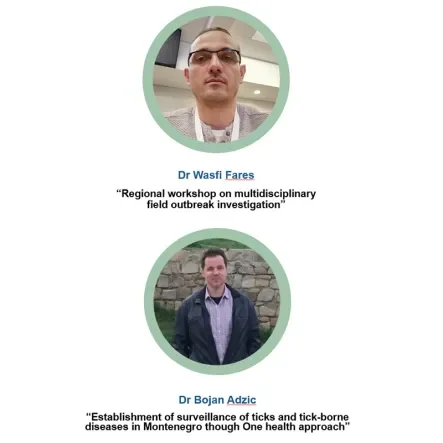
Leadership Initiative session
In March 2022, a call named 'Leadership Initiatives' was initiated by the coordination team, aiming to empower MediLabSecure beneficiaries to lead initiatives aligned with the project's scope. The objective was to cultivate a sense of ownership among the beneficiaries and provide them with a platform to showcase their capabilities. The response to the call was satisfying, with a multitude of applications exemplifying the unwavering dedication of the beneficiaries to the project.
The selection process proved to be challenging, given the quality of all the applications. Projects that embraced a regional perspective and involved multiple sectors were given preference. In this session, the eagerly awaited moment arrived as the awardees of the call were officially announced. It also provided the awardees with the opportunity to present their projects to the participants.
Allow us to introduce the two awardees:
- Dr. Bojan Adzic from the Diagnostic Veterinary Laboratory in Montenegro, with his project titled "Establishment of Surveillance of Ticks and Tick-Borne Diseases in Montenegro through One Health Approach", discover his project in this interview.
- Dr. Wasfi Fares from Institut Pasteur Tunis, Tunisia, with his project titled "Regional Workshop on Multidisciplinary Field Outbreak Investigation."
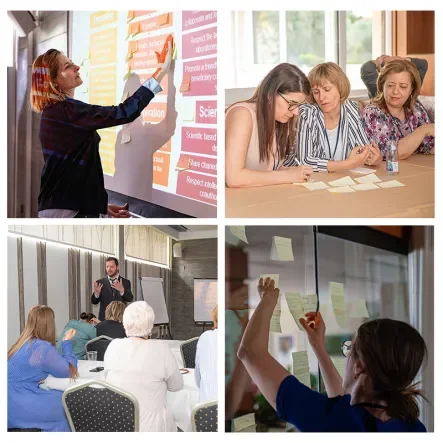
Charter of Values session
With the network's ownership belonging to its members, a collaborative and bottom-up approach was embraced. Previous regional meetings, namely the Sahel & North Africa region in 2020 and the Middle East region in 2022, provided a platform for network members to engage in collective brainstorming sessions. The purpose was to identify the core values and commitments that best represent the network. The Charter of Values took shape through the valuable contributions of the participants. To finalize the Charter, participants in this regional meeting were invited to come together and collectively validate what has been done by the participants from the two previous regional meetings and explore the concept of "Membership" within the MediLabSecure project. Split into two groups, a collective intelligence exercise was conducted, where participants addressed the question: "What does it mean to be a member of the MediLabSecure project?"
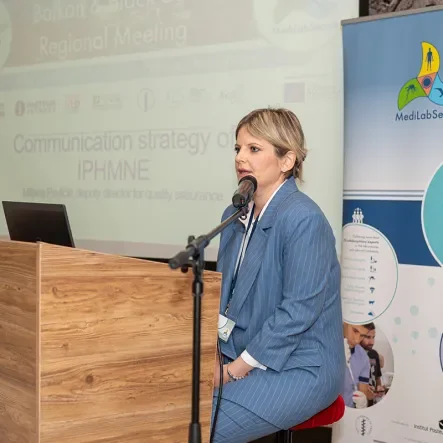
Communication preparedness session
Preparing for an epidemic also means being prepared to have good communication strategy during an outbreak. For this reason, the regional meeting devoted an introductory session to explain how it is important to prepare its communication strategy and how to manage it. Dr. Miljana Pavlivic from the Institute of Public Health Montenegro delivered a presentation on communication preparedness, with her expertise, she shared valuable insights and practical strategies for effective communication during public health emergencies. Miljana's contribution helped deepening the participants' understanding of the role communication plays in effectively managing public health emergencies.
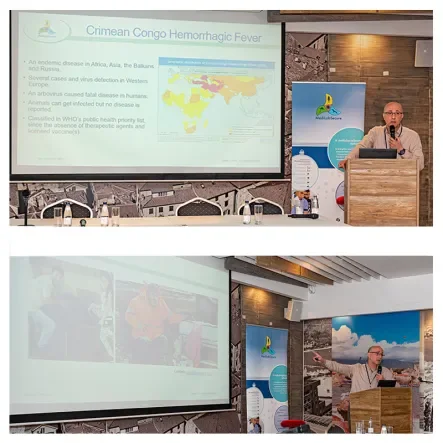
CCHF situation in the Balkan & Black Sea region session
Dr. Akut Ozkul, member of the network and Professor of Virology at the University of Ankara's Faculty of Veterinary Medicine, took the stage to deliver an insightful presentation on CCHF (Crimean-Congo Hemorrhagic Fever). With expertise and precision, Dr. Ozkul provided a comprehensive overview of the CCHF epidemic situation in the region. The presentation delved into various aspects, including entomological considerations such as the geographical distribution of ticks and the percentage of ticks carrying the virus. By offering a detailed description, Dr. Ozkul illuminated the audience on insights related to CCHF and its broader implications for public health and surveillance efforts.
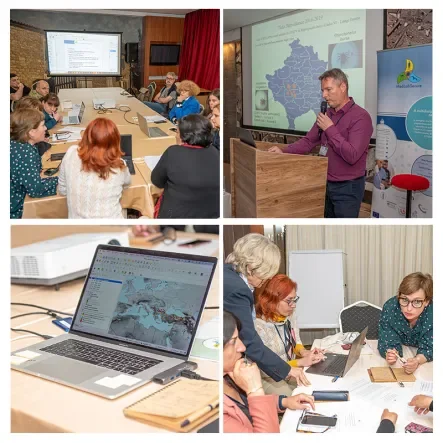
Multisecoral Exercise session
Designed in an engaging and interactive format, the session aimed to bolster capacities for integrated surveillance of arboviruses with a One Health approach. Working collaboratively, participants were divided by country, with each group tasked with either elaborating an integrated surveillance system for CCHF or presenting the existing system implemented in their respective countries. Following this, participants from two countries joined forces, pooling their expertise to develop action plans aimed at strengthening cross-border One Health surveillance for CCHF. This interactive session fostered knowledge exchange and facilitated practical steps toward enhancing integrated surveillance capabilities.
Gala Dinner
To celebrate the occasion of being reunited for this meeting, a gala dinner was held at the picturesque Eco Resort Plavnica, overlooking Skadar Lake. The evening provided a meaningful opportunity for networking and strengthening connections. Amidst the serene setting, participants enjoyed a delightful evening, sharing conversations and creating lasting memories. The gala dinner fostered a sense of camaraderie and celebration, amplifying the significance of our collective work in being one step ahead of public health emergencies.
